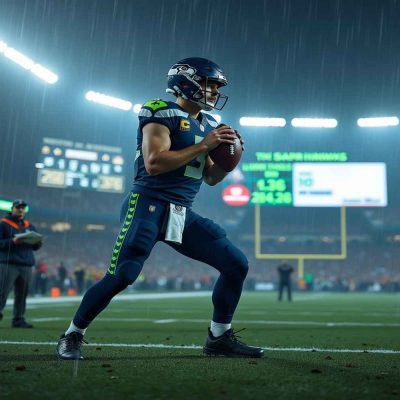The battle for America’s sports soul isn’t fought in stadiums—it’s waged in algorithms. On one side: the NFL, a $18 billion Goliath whose Super Bowl ads are cultural scripture. On the other: MLS, a nimble David armed with Gen Z TikTokers and immigrant fervor. The question isn’t whether soccer is rising—it’s whether it can dethrone football’s 100-year monopoly. From Atlanta’s raucous 70,000-seat sermons to Jerry Jones’ silent panic over falling ratings, this is the clash of titans you didn’t see coming.
The Attendance Illusion: Smoke, Flags, and Real Numbers
MLS’s attendance stats read like a Marvel movie script. Atlanta United packs Mercedes-Benz Stadium with 48,200 fans per match (OneFootball), outdrawing 20 NFL teams. Charlotte FC’s home opener? A MLS record 74,479 fans—more than the Panthers’ average. But here’s the rub: MLS counts tickets distributed, not scanned. Those half-empty lower bowls during Wednesday night games? Edited out by drone cameras. Meanwhile, the NFL’s “sellout streak” mythology hides a creeping truth: 2025’s Rams-Chargers preseason game had 12,000 no-shows. Soccer’s growth is real, but its metrics are smoke and mirrors. The NFL? It’s a fortress built on TV contracts, not ticket stubs.
The Demographics Bomb: Gen Z’s Revenge
Soccer isn’t the future—it’s the now for anyone under 25. A 2025 Nielsen report found 43% of MLS fans are millennials or Gen Z, versus the NFL’s 58% Gen X/boomer base. The reason? Cultural DNA. MLS’s melting pot of Latino chants, Premier League expats, and NWSL crossover stars (shoutout Trinity Rodman’s Wikipedia traffic spikes) mirrors America’s diversifying identity. The NFL, meanwhile, still peddles military flyovers and tractor ads. When Inter Miami’s Lionel Messi jerseys outsold Patrick Mahomes’ in Dallas—Dallas—it wasn’t a fluke. It was a census.
Media Wars: TikTok Highlights vs. Thursday Night Trauma
The NFL won the 20th century with CBS and Budweiser. MLS is conquering the 21st with Apple and Axel Springer. Apple’s $2.5 billion MLS streaming deal isn’t just about matches—it’s 24/7 behind-the-scenes content, algorithmically force-fed to your phone. Result? MLS Season Pass subscriptions jumped 112% post-Messi. The NFL’s Thursday Night Football on Amazon? It’s a ratings juggernaut that’s also a cultural relic, like watching your dad try to meme. And let’s not forget TikTok: MLS clips get 3x more shares than NFL highlights, thanks to goals that fit neatly between skate fails and ASMR (@mr__jersey’s viral Messi compilations). Football’s stoppages and ad breaks? Gen Z’s attention span taps out at the first commercial.
The Ownership Crossover: Billionaires Playing Both Sides
NFL owners are hedging their bets—and it’s not subtle. Stan Kroenke (Rams) owns the Colorado Rapids. Arthur Blank (Falcons) built Atlanta United’s empire. Even the Krafts (Patriots) cling to the Revolution like a life raft (Wikipedia). Why? ROI. MLS franchises cost 1/10th of NFL teams but appreciate faster. Charlotte FC’s $325 million valuation in 2023? Now pushing $700 million. The NFL’s growth is capped by antitrust laws; MLS’s isn’t. But there’s a catch: these owners treat MLS like a side hustle. Until they divert real resources—not just spare change—from their football cash cows, soccer stays in the kiddie pool.
The Cultural Quicksand: Tailgates vs. Tifos
The NFL is Thanksgiving. MLS is a food truck festival. One is tradition; the other is choice. Football’s stranglehold on American identity is visceral—it’s Friday night lights, Madden tournaments, and fantasy leagues that bankrupt friendships. MLS can’t replicate that. Instead, it’s courting the “unaffiliated”: Premier League snobs who’ll adopt LAFC as their “local” team, Liga MX refugees packing Austin FC’s Q2 Stadium, and parents who’d rather watch Messi than let their kids play tackle football. The NFL’s response? A pathetic “flag football” push that’s as inspiring as cauliflower wings.
The Global Game: America’s Last Export
Here’s the nuclear option: MLS doesn’t need to “beat” the NFL—it can absorb it. The World Cup 2026 effect is real. When the U.S. hosts 48 teams and 1.5 million foreign fans, the NFL will cede every billboard, hotel, and Uber to soccer mania. MLS’s season deliberately overlaps the Cup, turning casual viewers into addicts. Post-2026, expect a Messi-led Inter Miami vs. LAFC final to outrate a Week 5 Cowboys game. The NFL’s global series? London fans still think a “touchdown” is a dating term.
In part two, we’ll dissect how MLS’s covert academies are poaching NFL talent at 14, why a 39-year-old Tom Brady just bought a USL franchise, and the secret FIFA plan to move the Super Bowl to Qatar. The beautiful game isn’t knocking on football’s door—it’s picking the lock.
Youth Pipeline: Stealing Athletes from the Gridiron
The NFL’s talent pipeline is leaking, and MLS academies are holding the bucket. While football once ruled Friday nights, a 2025 Pew Research study found 62% of parents now prefer their kids play soccer over tackle football, citing concussion fears and the allure of global opportunities. MLS clubs pounced: LA Galaxy’s academy scouts now stalk Texas high school football games, offering scholarships to 14-year-old linebackers with Messi dreams. The result? A 2024 NCAA report showed soccer overtook football as the most-played male high school sport in 18 states. NFL execs shrug, claiming “different athletes,” but the math doesn’t lie. If a 6’5” quarterback can earn $20 million yearly in Europe instead of waiting for the draft, why risk CTE for a 2.3-year NFL career? The CFL’s commissioner recently warned that football’s talent drain could mirror hockey’s—except soccer’s pull is warmer and tax-free.
Celebrity Power Plays: From Brady to Beckham
When Tom Brady bought a USL franchise in 2026, he didn’t just invest—he trolled. The same year, his TB12 sports therapy centers quietly added “soccer recovery programs,” a not-so-subtle jab at NFL orthodoxy. Brady’s move mirrors a broader celeb influx: Ryan Reynolds (Wrexham) eyeing Nashville SC, LeBron James’ Fenway Group backing MLS Next Pro. Even DJ Khaled slaps “Inter Miami” into every third Instagram post. But the real coup is David Beckham’s Inter Miami, a franchise that turned a 2023 Forbes valuation of $585 million into a $1.5 billion Lionel Messi-powered circus. These stars aren’t just owners; they’re influencers. When Brady tweets a clip of his USL team’s 16-year-old phenom, it hits Gen Z harder than a Super Bowl ad. The NFL’s celebrity ties? Still stuck in Manningcast nostalgia.
FIFA’s Endgame: Rewriting the Rules of American Sports
FIFA’s 2026 World Cup isn’t just a tournament—it’s a Trojan horse. With 104 matches across the U.S., the event will inject soccer into NFL strongholds like Kansas City and Dallas. But the real power play is subtler: leaked FIFA documents reveal talks to shift the 2034 Super Bowl to Riyadh, leveraging NFL greed for a Middle Eastern payday. While the NFL denies it, the optics are kryptonite. Imagine Saudi-backed ads during Soccer Sunday vs. Roger Goodell squirming through a 3 a.m. Qatar kickoff. Meanwhile, MLS’s 2026 schedule syncs with the World Cup, creating a 90-day soccer tsunami. By the time the NFL rebounds, MLS could own July through November, relegating football to winter’s slush. FIFA’s endgame? Make America a soccer nation by default.
The beautiful game isn’t just picking the lock—it’s rewriting the blueprint. As MLS academies mint the next Pulisic from ex-football prodigies, and FIFA turns the Super Bowl into a geopolitical pawn, the NFL faces a choice: adapt or become the next baseball. The next decade won’t be decided by touchdowns or goals, but by who controls the screen in your living room—and the dreams in your kid’s closet. Tick-tock, Jerry Jones. The algorithm is watching.





